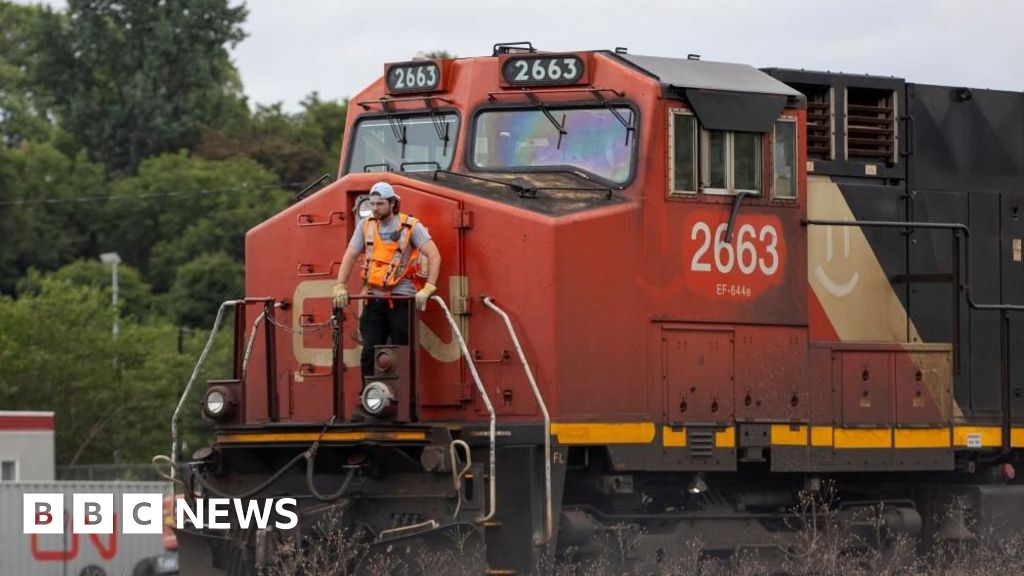A labour dispute between Canada's two major national railway companies and workers could lead to a potential shutdown starting Thursday morning, threatening vital supply chains across North America.
Canadian National Railway (CN) and Canadian Pacific Railway Kansas City (CPKC) plan to close their doors to about 9,300 workers starting at 00:01 EST (04:01 GMT) if a last-minute agreement fails.
Canada sends about 75% of its total exports to the United States, mostly by rail, and a prolonged dispute could disrupt shipments of a wide range of goods, from grains and beans to potash, coal and timber.
Negotiations over shift scheduling, fatigue provisions and wages have stalled.
Prime Minister Justin Trudeau on Wednesday urged the two sides to continue talks.
“Millions of Canadians, workers, farmers and businesses across the country are counting on both sides to do the work and come to a solution,” he said in brief remarks, without answering questions.
Dozens of industry and trade organizations warned in an open letter last week that the disruption would have an “immediate impact” from coast to coast and would damage Canada’s reputation as a trading partner.
“Considering the millions of Canadian jobs that will be affected, the scale of the disruption will be enormous,” the company said.
In a joint statement issued by the U.S. and Canadian Chambers of Commerce on Tuesday, the chambers warned of the potential “devastating” impact of the strike.
They said the decision “would be devastating to Canadian businesses and families and have significant impacts on the U.S. economy.”
A group of agricultural trade associations has urged Ottawa to intervene, but the government has so far refused.
Federal Labor Minister Steve McKinnon is due to meet with both sides this week, but has resisted calls for binding arbitration.
The operating agreements for both companies expired at the end of last year.
Both the CPKC and CN have informed the union that they will begin closing their doors to members on Thursday. The Teamsters Canada Rail conference separately issued a 72-hour strike notice to the CPKC on Sunday.
Rail networks in the United States and Mexico will continue to operate, but disruptions north of the border could impact all of North America.
U.S. Transportation Secretary Pete Buttigieg said on Twitter on Monday that he was monitoring the rail negotiations and the potential impact on the flow of goods across the border.
C$380 billion (£214 billion) worth of goods are moved by rail each year, and railways carry half of the country's goods for export, according to the Canadian Railway Association.
This week, both CPKC and CN have already started to hold some cargoes in preparation for the shutdown. Chemicals such as ammonia, used as a fertilizer, and chlorine, used in water treatment, have now been banned to avoid them being stuck on the rails if work stops.
Shipping company Maersk on Monday stopped accepting shipments to Canada that were supposed to be transported by rail and that cannot be moved by heavy trucks instead.
The Canadian Pork Board has warned that the industry's reliance on railways for feed for its animals is putting their welfare at risk.
“Canada’s red meat processors need stable and reliable supply chains to run their businesses,” said Chris White, CEO of the Canadian Meat Council, in a statement.
“A service outage would result in millions of dollars in losses, irreparable reputational damage, environmental challenges related to waste disposal, and massive waste.”
The shutdown could also disrupt public transportation in major Canadian cities like Toronto or Montreal, as some employees will be forced to stop working.
Professor Barry Prentice, director of the University of Manitoba's Transportation Institute, said the government is likely to pass back-to-work legislation in the coming days if the two sides cannot reach an agreement, as has happened in previous similar disputes.
“This is not the best way to run the show,” he told the BBC.
“But it seems that this is the playbook, and we are back in this cycle again,”
With additional reporting by Michel Fleury.

“Extreme travel lover. Bacon fanatic. Troublemaker. Introvert. Passionate music fanatic.”







More Stories
Best National Burger Day Deals 2024
Trump attacks Fed for ‘playing politics’ with historic rate cut
Tesla “Magnificent Seven” (TSLA) shares report third-quarter earnings this week. Is it a buy before the results?